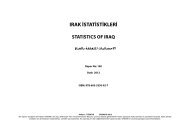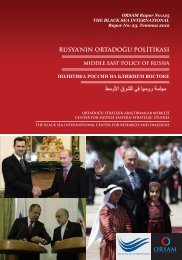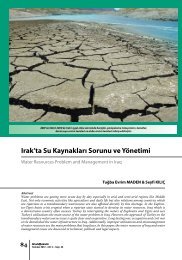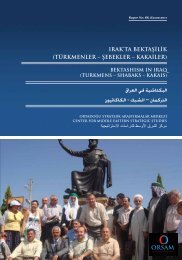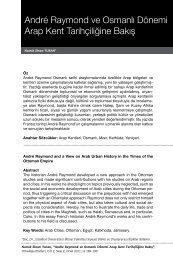“ÜÇÜNCÜ DALGA”: POSTMODERNİZMİN JEOPOLİTİĞİ - orsam
“ÜÇÜNCÜ DALGA”: POSTMODERNİZMİN JEOPOLİTİĞİ - orsam
“ÜÇÜNCÜ DALGA”: POSTMODERNİZMİN JEOPOLİTİĞİ - orsam
Create successful ePaper yourself
Turn your PDF publications into a flip-book with our unique Google optimized e-Paper software.
“THE THIRD WAVE”: GEOPOLITICS OF POSTMODERNISM<br />
THE BLACK SEA INTERNATIONAL<br />
ORSAM<br />
3. The group of the natural-science definitions<br />
are determined as action making, teleological<br />
and system definitions of the Concept. Action<br />
making definitions open synergetic character<br />
of geopolitical processes, dynamics of<br />
sociopolitical systems in conditions of social<br />
chaos and entropy, as well as application of<br />
modern political and information technologies.<br />
They characterize geopolitics as process<br />
of monitoring and estimation of geopolitical<br />
conditions with use of mathematical methods<br />
of simulation of the sociopolitical processes<br />
used by the political leaders for elaboration of<br />
internal and foreign policy.<br />
The teleological definition of geopolitics<br />
considers it as an activity of a political management<br />
on finding solutions of geopolitical<br />
tasks. Here it is necessary to note the following<br />
constructive moment: necessity of a<br />
combination of the collective nature of the<br />
international and interstate politics expressed<br />
in joint conscious and purposeful activity of<br />
social groups, political parties, social movements,<br />
the states and their associations on<br />
achievement of definite purposes. Now the<br />
given aspect is especially actual in view of increase<br />
of social entropy shown in the form of<br />
any kind of “color” revolutions and “popular<br />
uprisings”, activity of oppositional and separatists<br />
movements in which the role and the<br />
importance of even one social individual of<br />
society grows comes up to nation-wide scale.<br />
Generalizing the above mentioned system of<br />
definitions of the Concept, it is possible to formulate<br />
its base definition as an area of scientific<br />
knowledge, post-nonclassical in its form<br />
and synergetic in its content which describes<br />
the sociopolitical relations, organization and<br />
assimilation of geopolitical spaces and it’s resources<br />
for establishment of leadership, military-political<br />
and economic domination with<br />
use of military or economical force, information,<br />
psychological and political technologies<br />
in conditions of globalization.<br />
Paradigms of “The Third Wave” Geopolitical<br />
Conception<br />
A “Paradigm” is one of the major concepts in<br />
philosophy and sociology, introduced by T.<br />
Kuhn in his book “The Structure of Scientific<br />
Revolutions” 7 in which he defined this term<br />
as a set of fundamental scientific installations,<br />
representations and notions, perceived by<br />
scientific community as a basis of given scientific<br />
field.<br />
In geopolitics the concept of paradigm is formulated<br />
as follows: the paradigm is designed<br />
to provide the valuable and world outlook basics<br />
to research existential relations between<br />
the states in the modern world in view of all<br />
crucial factors which determine dynamics<br />
and an evolution of sociopolitical processes.<br />
The task of the given scientific category is to<br />
generalize the phenomena and tendencies of<br />
an observable reality and to select primary<br />
factors for further conceptual interpreting of<br />
this reality, but without distortion of its essence.<br />
Geopolitical paradigms include nationalstate,<br />
ideological, cultural and religious factors.<br />
Now it’s time for dynamic approach to<br />
the geopolitics phenomena. The modern geopolitics<br />
paradigm must to reflect changes in<br />
various interpretations of geopolitics’ space:<br />
institutional, economical, ideological, cultural,<br />
religious and informational. Change<br />
of paradigms is a change of relations between<br />
socio-political objects, which supposes<br />
change of scientific methods of analysis. 9<br />
Full harmony in geopolitics has not been observed<br />
yet. “Despite a huge file of works on<br />
geopolitics, there is still one principal lack:<br />
imprecise classification of paradigms. It leads<br />
to various disagreements on what is true geopolitics,<br />
what concepts are adequate to the<br />
present day and what must be thrown away”. 10<br />
Trying to solve the given problem, some researchers<br />
go on replacing geopolitics with<br />
the black sea ınternatıonal<br />
Report No: 26, November 2012<br />
11




